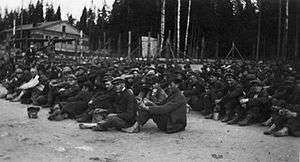Tammisaari prison camp

Tammisaari prison camp was a prison in Dragsvik, Ekenäs in Finland. It was established for the captured Red Guard members at the end of Finnish Civil War in May 1918 and controlled by the White Guards. Tammisaari was known as the most notorious of all Finnish Civil War prison camps.[1] Since the 1920s the penitentiary served as a labor camp for politically jailed communists.[2]
Finnish Civil War
The first captured Reds were transferred to the former barracks of the Imperial Russian Army in Dragsvik in early May 1918. During the next six months, 8,597 prisoners were held in Tammisaari, it was about 11% of all the captured Reds. Conditions in the camp were horrible, general hygiene was bad and there was a lack of food supplies. Inmates died of malnutrition and various disease, including the Spanish influenza that caught Finland in July.[3] According to the War Victims of Finland 1914–1922 internet database, a total number of 2,997 prisoners died in Tammisaari between May and December 1918.[4] The mortality rate was 34%, which was the highest among the Finnish Civil War prison camps. The deceased were buried in a mass grave outside the prison.[3] A memorial was erected in 1951 and a permanent exhibition opened in 2008.[5]
Political prisoners
After the mass amnesties of the Civil War prisoners Tammisaari penitentiary was turned into a labor camp for political prisoners, meaning the activists of the banned Communist Party of Finland and Socialist Workers' Party of Finland.[2] Female prisoners, like Hertta Kuusinen, were held at the Häme Castle in Hämeenlinna. The political prisoners had some privileges, they had less work and were allowed to order newspapers. As the communists spent a lot of time in reading and studying smuggled Marxist literature, the camp was nicknamed the "University of Tammisaari".[6]
During the 1920s and 1930s the number of captured communists varied between 100 and 600. The highest number was after the declaration of the 1930 Communist Laws. In July 1933 more than 370 prisoners went on a hunger strike and finally after 11 days, five died of force-feeding.[7] The penitentiary was active until 1940. During the World War II the prisoners were transferred to newly established concentration camps around Finland and Tammisaari was used as a garrison by the Finnish Army.
Notable inmates
- Aimo Aaltonen (1934–1940)
- Aleksanteri Ahola-Valo (1939–1940)
- Aarne Arvonen (1918)
- Yrjö Leino (1935–1938)
- Toivo Hjalmar Långström (1923–1926, 1930–1934)
- Julius Nurminen (1918)
- Ville Pessi (1935–1940)
- Arvo Tuominen (1922–1926, 1928–1933)
- Kaarlo Uskela (1918–1919)
- Niilo Wälläri (1923–1928)
- Armas Äikiä (1927–1928, 1930–1935)
References
- ↑ Christie, Kenneth & Cribb, Robert: Historical Injustice and Democratic Transition in Eastern Asia and Northern Europe: Ghosts at the Table of Democracy, Routledge 2002. ISBN 978-070-07159-9-2. Google Books
- ↑ 2.0 2.1 Tepora, Tuomas & Roselius, Aapo: The Finnish Civil War 1918: History, Memory, Legacy, p. 116. Brill Academic Publishers 2014. ISBN 978-900-42436-6-8. Google Books
- ↑ 3.0 3.1 Tepora & Roselius, p. 113–114.
- ↑ Tammisaaren vankileiri War Victims of Finland 1914–1922 Internet Database. Retrieved 19 February 2015.
- ↑ Tammisaari prison camp memorial Tammisaari 1918. Retrieved 19 February 2015.
- ↑ "The Long Roots of Anticommunism in Finland and in the Baltic Countries" Communist Party of Finland, 18 February 2013. Retrieved 19 February 2015.
- ↑ Rislakki, Jukka: Maan alla, p. 167. Love Kirjat 1985. ISBN 951-835-099-X,
External links
- Image of the Tammisaari prison camp memorial Panoramio.com
Coordinates: 59°59′16″N 23°29′10″E / 59.98778°N 23.48611°E